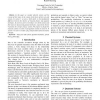91 search results - page 2 / 19 » Representing the Adverb Very in Fuzzy Set Theory |
GIS
2000
ACM
13 years 5 months ago
2000
ACM
Traditionally, the classes in thematic maps have been treated as crisp sets, using classical set theory. In this formulation, map classes are assumed to be mutually exclusive and e...
EUSFLAT
2009
13 years 3 months ago
2009
In this paper we consider physical systems and the concept of their states in the context of the theory of fuzzy sets and systems. In section 1 we give a brief sketch on the fundam...
FSKD
2005
Springer
13 years 10 months ago
2005
Springer
Abstract. We introduce a property of set to represent vagueness without using truth value. It has gotten less attention in fuzzy set theory. We introduce it by analyzing a well-kno...
ASC
2011
13 years 8 days ago
2011
Machine learning, data mining, and several related research areas are concerned with methods for the automated induction of models and the extraction of interesting patterns from ...
IJCNN
2007
IEEE
13 years 11 months ago
2007
IEEE
— In the process of learning a pattern I, the Fuzzy ARTMAP algorithm templates (i.e., the weight vectors corresponding to nodes of its category representation layer) compete for ...

